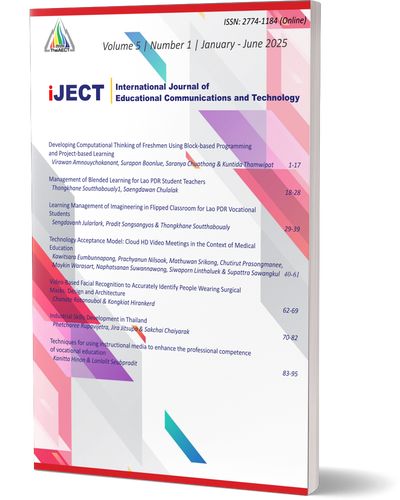Enhancing Computational Thinking through Project-Based Learning: A Structured Framework and Empirical Analysis
Keywords:
Project-based learning, Computational thinking, Iterative development, Instructional design, Educational framework.Abstract
This research investigates the integration of project-based learning with computational thinking to develop an effective instructional framework. The study aimed to: 1) develop a conceptual framework for project-based learning that enhances computational thinking, 2) construct a practical model derived from this framework, and 3) evaluate the post-intervention learning outcomes. The research instruments comprised a structured project-based learning process and a validated assessment tool for computational thinking skills. The results revealed that 83.87% of the participants (n=31) demonstrated proficiency in computational thinking skills after engaging with the learning process, exceeding the established threshold of 80%. The framework exhibited a high degree of reliability (α=0.81), while the assessment tool demonstrated appropriate difficulty indices (p=0.32-0.74) and discrimination indices (r=0.37-0.76). The efficacy of this approach is attributed to its facilitation of iterative development through hands-on problem-solving activities that produce tangible outcomes. This study contributes to educational methodology by providing an empirically-validated framework that systematically develops computational thinking through project-based experiences.
References
Arochman, T., Margana, M., Ashadi, A., Achmad, S., Nugrahaeni, D. A., & Baihaqi, I. (2024). The effect of project-based learning on English writing skill for EFL learners. Journal of Pedagogical Research, 8(2), 310-324. https://doi.org/10.33902/JPR.202423961
Ashraf, M. H., Özpolat, K., Yalcin, M. G., & Shah, P. (2025). A project-based learning approach to supply chain mapping education. International Journal of Management Education, 23(2), 1-15. https://doi.org/10.1016/j.ijme.2024.101128
Chronicles. (2023). Explore the power of project based learning in boosting critical thinking. https://www.extramarks.com/blogs/schools/explore-the-power-of-project-based-learning-in-boosting-critical-thinking/
Cuyacot, E. P., & Cuyacot, M. T. (2022). Competency-based education: learner’s new process for success. International Journal of Research Studies in Education, 11(4), 89-101. https://doi.org/10.5861/ijrse.2022.165
Dia, I. O., Putra, Z. H., Witri, G., Dahnilsyah, & Aljarrah, A. (2024). Development of a traditional game-based computational thinking supplementary textbook for elementary school students. Mathematics Teaching-Research Journal, 16(2), 185-206. https://files.eric.ed.gov/fulltext/EJ1442388.pdf
Efstratia, D. (2014). Experiential education through project based learning. Procedia - Social and Behavioral Sciences, 152(2014), 1256-1260. https://doi.org/10.1016/j.sbspro.2014.09.362
Istiningsih, I., Unruh, T., Sutrisno, S., & Kurniawati, U. M. (2024). Active learning with research based on three principles of higher education. Journal of Education and Learning, 18(2), 421-429. https://doi.org/10.11591/edulearn.v18i2.20966
Kerdpol, S. (2015). An application of project-based learning on the development of young local tour guides on tai phuan’s culture and tourist attractions in sisatchanalai district, sukhothai province. English Language Teaching, 9(1), 133-141. https://doi.org/10.5539/elt.v9n1p133
Khlaisang, J., Huang, F., Koraneekij, P., & Teo, T. (2023). Using mobile technologies to teach 21st century learning skills: a study of teachers’ acceptance in Thai secondary schools. International Journal of Mobile Learning and Organisation, 17(1), 254-279. https://doi.org/10.1504/ijmlo.2023.128343
Koednet, A., & Phaudjantuk, S. (2021). Enhancing the learning management design abilities of third-year students in the bachelor of education program in Mathematics through the use of learning management through practical skills. Journal of Education Studies, 49(2), 1-15. https://digital.car.chula.ac.th/educujournal/vol49/iss2/11/
Koednet, A., Samutpaochinda, P., & Pinchinda, P. (2021). Online classroom management with the smiles model to enhance a new normal learning in the education transformation through digital technology. Panyapiwat Journal Editorial Division, 13(1), 294-307. https://so05.tci-thaijo.org/index.php/pimjournal/article/view/246785
Li, Y., Schoenfeld, A. H., diSessa, A. A., Graesser, A. C., Benson, L. C., English, L. D., & Duschl, R. A. (2020). On computational thinking and stem education. Journal for STEM Education Research, 3(2), 147-166. https://doi.org/10.1007/s41979-020-00044-w
Muhammad, I., Rusyid, H. K., Maharani, S., & Angraini, L. M. (2023). Computational thinking research in mathematics learning in the last decade: a bibliometric review. International Journal of Education in Mathematics, Science and Technology, 12(1), 178–202. https://doi.org/10.46328/ijemst.3086
Nilsook, P., Chatwattana, P., & Seechaliao, T. (2021). The project-based learning management process for vocational and technical education. Higher Education Studies, 11(2), 20-29. https://doi.org/10.5539/hes.v11n2p20
Ozkan, Z. C. (2023). The effect of project-based learning in visual arts lesson on lesson outcomes and attitudes. International Journal on Social and Education Sciences, 5(2), 367–380. https://doi.org/10.46328/ijonses.565
Plailek, T., Kitjarak, T., & Plailek, W. (2023). Improving creative problem-solving abilities of english students through hyflex learning management and project-based learning. Higher Education Studies, 13(4), 128-135. https://doi.org/10.5539/hes.v13n4p128
Prahmana, R. C. I., Kusaka, S., Peni, N. R. N., Endo, H., Azhari, A., & Tanikawa, K. (2024). Cross-cultural insights on computational thinking in geometry: Indonesian and Japanese students’ perspectives. Journal on Mathematics Education, 15(2), 613-638. https://doi.org/10.22342/jme.v15i2.pp613-638
Qassrawi, R. (2023). Education 3.0 underpinned with the heutagogical approach for a smooth shift to distance learning in higher education. International Journal of Education and Practice, 11(1), 1-13. https://doi.org/10.18488/61.v11i1.3238
Rahmawati, R. D., Sugiman, Wangid, M. N., & Purnomo, Y. W. (2024). Designing model of mathematics instruction based on computational thinking and mathematical thinking for elementary school student. Mathematics Teaching-Research Journal, 16(1), 143-166.
Shin, N., Bowers, J., Krajcik, J., & Damelin, D. (2021). Promoting computational thinking through project-based learning. Disciplinary and Interdisciplinary Science Education Research, 3(2), 1-15. https://doi.org/10.1186/s43031-021-00033-y
Ugur, N., & Çakiroglu, Ü. (2024). Implementing reflective thinking in computer science unplugged to enhance computational thinking. International Journal of Technology in Education and Science, 8(2), 196-218. https://doi.org/10.46328/ijtes.515
UNESCO. (2023). Education 2030: Bringing into focus the future of the right to education. https://articles.unesco.org/sites/default/files/medias/fichiers/2023/12/Future-of-right-to-education-working-document-en.pdf
Wanglang, C., & Chatwattana, P. (2023). The project-based learning model using gamification to enhance 21st century learners in Thailand. Journal of Education and Learning, 12(2), 99-105. https://doi.org/10.5539/jel.v12n2p99
Wannapiroon, N., & Pimdee, P. (2022). Thai undergraduate science, technology, engineering, arts, and math (STEAM) creative thinking and innovation skill development: a conceptual model using a digital virtual classroom learning environment. Education and Information Technologies, 27(4), 5689–5716. https://doi.org/10.1007/s10639-021-10849-w
Wannapiroon, P., Nilsook, P., Jitsupa, J., & Chaiyarak, S. (2022). Digital competences of vocational instructors with synchronous online learning in next normal education. International Journal of Instruction, 15(1), 293-310. https://doi.org/10.29333/iji.2022.15117a
Yang, H., Zhang, Q., & Shen, M. (2024). The practice and research of junior high school information technology project-based learning based on STEM education concept. International Journal of Technology in Education and Science, 8(1), 63-74. https://doi.org/10.46328/ijtes.537
Yang, S., Zhu, S., & Qin, W. (2025). Enhancing computational thinking assessment: A multimodal cognitive diagnostic approach. Thinking Skills and Creativity, 56(2025), 1-13. https://doi.org/https://doi.org/10.1016/j.tsc.2025.101752
Yuyu Wahyudin. (2023). Application of the project based learning model to improve student learning outcomes. Journal of Teaching and Education Management, 1(2), 37–49. https://doi.org/10.61166/bgn.v1i2.37
Zapata-Cáceres, M., Marcelino, P., El-Hamamsy, L., & Martín-Barroso, E. (2024). A bebras computational thinking (abc-thinking) program for primary school: evaluation using the competent computational thinking test. Education and Information Technologies, 29(2024), 14969–14998. https://doi.org/10.1007/s10639-023-12441-w
Downloads
Published
How to Cite
Issue
Section
License
Copyright (c) 2025 International Journal of Educational Communications and Technology

This work is licensed under a Creative Commons Attribution-NonCommercial-NoDerivatives 4.0 International License.







